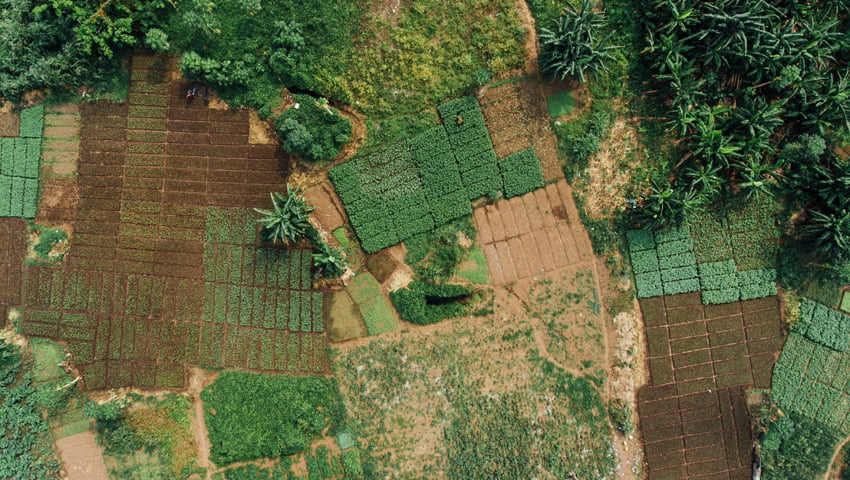The Alliance for Food Sovereignty in Africa led a delegation of farmers and civil society organisations to the African Union’s Fertilizer & Soil Health Summit in Nairobi in early May. Over a thousand people attended from across Africa and the world.
The Summit aimed to highlight the crucial role of fertilizer and soil health in stimulating sustainable pro-poor productivity growth in African agriculture and to agree a 10-year African Fertilizer and Soil Health Action Plan, as well as the Soil Initiative for Africa.
The 10-year action plan aims to “significantly increase investments in the local manufacturing and distribution of mineral and organic fertilizers, biofertilizers and bio-stimulants” and to “triple fertilizer use from 18 kg/ha in 2020 nutrients to 54 kg/ha in 2033.”
Soil degradation is increasing, with over 20 per cent of land in most African countries already being degraded. Reported yield losses range from moderate to catastrophic levels (more than 50 per cent), depending on crop, soil type, climate, and production systems, with most studies reporting significant losses (UN FAO).
Many African countries including Ethiopia, Zimbabwe, Malawi, Zambia, and Kenya reported that their soils are now acidified, caused by intensive monocropping and the prolonged use of nitrogen-based fertilizers.
All agree that mineral fertilizers are not adequate on their own, yet Africa is being pushed to triple fertilizer use.
The Russian war in Ukraine has driven up fertilizer prices, increasing the debt burden of African nations and individual farmers. Kenya spends 60 per cent of its annual budget on debt repayments, while the world’s largest fertiliser companies are making record profits. Kenya is using an average of 57kgs of fertilizer per hectare but produces less grain per hectare than Uganda which is using only 2kgs per hectare.
Discussions focussed on how to increase use of synthetic fertilizers, not on soil health. Discussions were narrowly confined to technical aspects of fertiliser distribution and use. There was little discussion of social aspects, the impact on local economies, or farmer preferences.
Many countries acknowledged that fertilizer subsidies across Africa did not work and had failed. Furthermore, the World Bank was reported to have said that their loans to support subsidies were spent on the “wrong fertilizers” due to the widespread practice of using generic fertilizers, e.g. NPK, DAP, or urea, irrespective of soil type or condition. Right now, a Kenyan Agriculture Minister faces dismissal for distributing fake fertilizers through a subsidy program.
An AFSA spokesperson said, “The language of the Summit was interesting. We didn’t hear about ‘synthetic fertilizers’, or ‘chemical fertilizers’, or ‘artificial fertilizers’; we only heard the term ‘mineral fertilizers’. (Note: Nitrogen is not a mineral, while phosphate and potash are synthesised or chemically altered in the fertilizer production process). The imperative to increase fertilizer use was reflected in top-down language urging ‘behaviour change’ of farmers, and ‘localisation’ of fertilizer strategy.
“No one mentioned the elephant in the room – fossil fuels – huge amounts of which are used in the production and distribution of fertilizers. (Note: The global climate impact of nitrogen fertilizer alone exceeds that of commercial aviation). Water scarcity and its crucial role in soil health was also ignored.”
Several governments including Zambia, Namibia, Malawi, and Burundi recognised the damaging effects of inorganic fertilizers on soil health, pollution and land degradation, and called for a balance between organic and inorganic fertilizers. Some countries noted that we need to view our work through the lens of food sovereignty.
The Alliance for Food Sovereignty in Africa said that it, “recognizes and commends the AU’s commitment to reversing soil degradation and addressing hunger, malnutrition, and poverty. We know that soils across Africa are seriously depleted. They have lost organic matter and are missing the highly diverse microbial life of healthy natural soils. There is an urgent need for proactive interventions to arrest and reverse soil degradation.
“We welcome the recognition of the role of biofertilizers and bio-stimulants in the 10-year action plan. This is a long-awaited and welcome shift in thinking. Africa is waking up to the need for a shift to agroecological approaches. The implementation of the 10-year action plan should include farmers, civil society organizations, and agroecology practitioners to craft strategies that reflect local realities and needs. Prioritizing indigenous seed diversity and reducing dependency on imported synthetic fertilizers will strengthen ecological resilience and food security while preserving the environment. By investing in sustainable, locally-driven, agroecological soil health practices, African nations can reduce their economic burden and build a future that benefits both communities and ecosystems.”
Afsa recommendations:
- Focus on Agroecology: We call upon governments to recognize and integrate the transformative potential of agroecology to sustainably increase food security and food sovereignty, reducing poverty and hunger while conserving biodiversity and respecting indigenous knowledge and innovation
- Develop new biological indicators for soil health: Current indicators focus on the chemical content of soils and synthetic fertilizers. We need indicators that reflect the biological activity of living soil, and that can be measured by farmers
- Invest in agroecological research: Policymakers and donors should allocate more funding for participatory research into agroecological approaches to soil health
- Promote bio-fertilizer production and phase out imported chemical fertilizers: Rapidly replace chemical fertilizers with agroecological bio-inputs, biofertilizers and bio-stimulants
- Involve farmers and civil society: Farmers and civil society must be part of developing a soil health strategy to ensure that plans respond to the real needs and contexts of small-scale farmers
